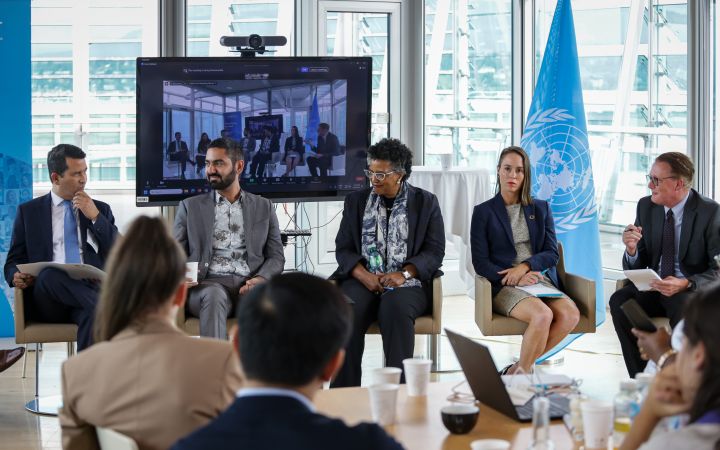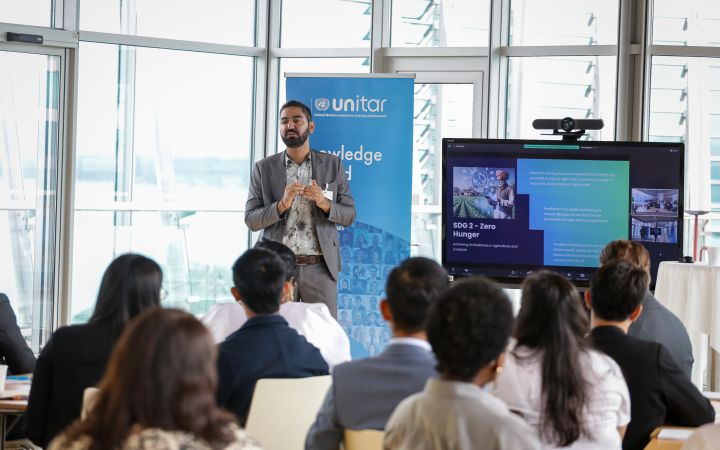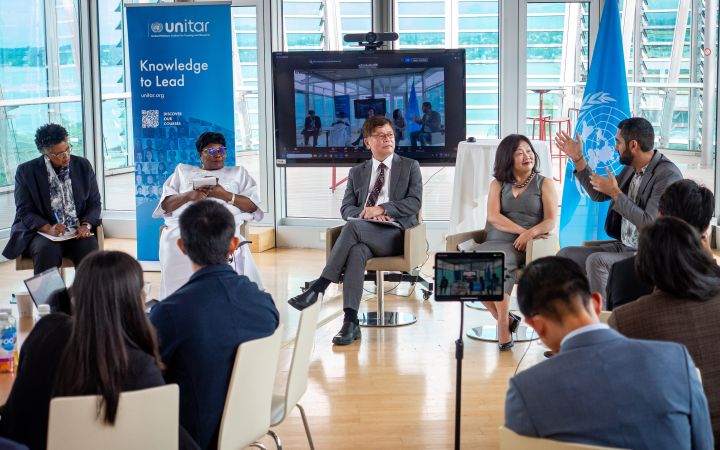- On 4 September 2024, UNITAR hosted in Geneva a workshop and a panel discussion on AI-driven sustainable solutions for global challenges.
- In the morning workshop, 40 participants engaged in exercises and group discussions to navigate the ethical considerations of AI use and explore best practices from low-resource settings in health care, education, agriculture and climate action.
- Over 40 participants joined in person for two panels led by the members of UNITAR Division for Prosperity Advisory Board, where they explored the role of AI in strengthening societal resilience and in the prevention of financial crime.
20 September 2024, Geneva – The United Nations Institute for Training and Research (UNITAR) hosted a workshop and a panel discussion “AI-Driven Sustainable Solutions – Pioneering Innovations to Overcome Global Challenges” on 4 September 2024 in Geneva to discuss the responsible use of AI for sustainable development.
HANDS-ON WORKSHOP
The morning workshop welcomed 40 participants who joined to gain knowledge, skills and connections to become a driving force in the responsible application of AI technologies. UNITAR Executive Director Nikhil Seth welcomed them by saying:
Remember that it was curiosity, in the first place, which got us to where we are. And it’s your curiosity in applying all this [technology] for the values and the goals of the United Nations that will make its applications even better.”
Participants engaged in hands-on exercises and group discussions to navigate ethical considerations and best practices on the use of AI, while distinguished expert, Mr. Vedant Ahluwalia, led microsessions on AI applications in health care, education, agriculture and climate action. Through compelling case studies from low-income countries, the workshop highlighted both the challenges as well as the successes of implementing AI in resource-constrained settings.
After the workshop, participants were able to exchange their views and further discuss their learnings and ideas with the experts and UNITAR Division for Prosperity Advisory Board members.
The workshop was incredibly valuable, packed with great insights and practical takeaways that will make a real impact.” - Twalumba Munkombwe
The case studies from the panellists on cybersecurity and crime fighting were particularly enlightening. The workshop has equipped me to further explore integrating AI literacy in education in developing countries. I would highly recommend this workshop to colleagues seeking to implement AI solutions in their work towards achieving the Sustainable Development Goals.” - Mahmoud Hamarsheh
Panel Discussion
Over 40 individuals gathered in person for the two afternoon panel discussions. UNITAR Division for Prosperity Director Mihoko Kumamoto opened the floor, saying:
AI can help accelerate all areas of sustainable development. Simultaneously, we all know that there are challenges, risks associated with AI and digital technologies. What’s important is that we embrace these opportunites while being aware of the challenges – making sure that we correctly use it to achieve a sustainable future, not exacerbate division or inequality.”
Panel session 1: AI innovations for strengthening societal resilience
The first panel session focused on strategies to leverage AI for livelihood development, climate action, disaster resilience, education and capacity-building, and building trust and transparency around AI usage.
“If we can rethink or reshape the youth’s thinking, we can tackle poverty, we can tackle inequality, and we can tackle unemployment in Africa by optimizing AI and learn from the best practices from all around the world.” – Prof. Sarah Anyang Agbor, Division for Prosperity Advisory Board Member
Moderator
- Ms. Linda Hill (Faculty Chair, Leadership Initiative, Harvard Business School)
Panellists
- Prof. Sarah Anyang Agbor (Vice President, Forum for African Women Educationalists Africa Board)
- Mr. Vedant Ahluwalia (CEO, Dataviv Technologies)
- Mr. Tetsuo Kondo (Visiting Professor, Development and Global Health Policy)
Ms. Jaehyang So (Chair of the Technical Committee, Global Water Partnership)
Panel session 2: AI innovations and solutions for prevention of financial crime
Discussion for the second session focused on the role of AI in preventing and detecting financial crimes and countering money-laundering and for regulatory compliance.
AI technologies, capable of comprehending complex data, will revolutionize this struggle [of combating financial crimes]. By training AI models on vast data sets, we can identify anomalies in financial transactions, detect aberrant behaviour, recognize money-laundering schemes, anticipate emerging threats and uncover hidden patterns that characterize novel financial crimes.” —Mr. Luis Eduardo Llinás Chica, Director General, Financial Intelligence Unit of Colombia (UIAF)
Moderator
- Mr. Michael Fors (Adjunct Professor, Stanford University, Columbia University, and the University of Washington)
Panellists
- Mr. Vedant Ahluwalia (CEO, Dataviv Technologies)
- Mr. Luis Eduardo Llinás Chica (Director, Financial Intelligence Unit of Colombia)
- Ms. Linda Hill (Faculty Chair, Leadership Initiative, Harvard Business School)
- Ms. Ashleigh Owens (Deputy Director and Financial Institutions Lead, Shift)
AI-Driven Sustainable Solutions to Overcome Global Challenges Workshop Recording
AI-Driven Sustainable Solutions to Overcome Global Challenges Panel Discussion Recording
about unitar
The United Nations Institute for Training and Research (UNITAR) is a dedicated training arm of the United Nations. In 2023, UNITAR trained over 540,000 learners around the world to support their actions for a better future. In addition to our headquarters in Geneva, we have offices in Hiroshima, New York and Bonn and networks around the world.




